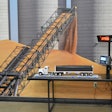
People are people — many folks (not all of us mind you!) like to take the easy way to do things. While we may work hard, and we may exercise at the health club, work late to get the payroll done, or force ourselves to have the conversation with that problematic employee — it is difficult to continue to focus and work on what we will call the “big, hard things.” However, many times we share with our students that the magic occurs outside of your comfort zone (see Figure 1).
Why is this? We are creatures of habit, and while many of us don’t mind sweating for an hour at the gym, prolonged, sustained work is really hard. However, the payoff can be substantial. In this issue’s column we look at ways to assist you in tackling the tough problems or projects.

Different kinds of hard
We would propose that there are “different kinds” of things which are hard to do. A first category would be those things that you might classify as hard physically. As a feed and grain manager, there may be some work projects you do which are hard physically (climbing to the top of a grain leg, or helping to unload grain at harvest); however, we would argue that much of management is not “hard” physically. Our thought here is that some projects become hard in what we are calling a physical sense in that they take time, and become physically draining because you need stamina to complete them.
Another type of “hard” would be things that are tough in a mental sense. To accomplish many of these hard things you need persistence and perseverance. You do not always have lengthy, quality time to work on big projects. Instead, we often have many short time periods that make it hard to work on big projects and sometimes make it hard to even want to start on them.
Contrast the difficult challenges discussed above, with those things you might find hard to do because they are outside of your comfort zone (see Figure 1 again). These are things you may be reluctant to take on simply because you have not tried them before, or you are concerned about the risk involved, or you are worried about the way something might appear, or you have professed that you don’t like something. (One of us now eats spicy foods because our spouse kept asking us to try some of these new foods — and you know what — now I like them!) As we discuss below, taking on the hard things can be good for business, and they can also be good for you individually — they keep you challenged and on top of your game.
Breaking old bad habits or starting new good habits
One of the possible modes for doing the hard things is to break old bad habits or form new good habits. We have covered this previously in Manager’s Notebook in April/May 2015. As we discussed in that column, breaking habits or creating new ones is extremely difficult — but can be done. And, it can be worthwhile if it stretches you to remake yourself or your business. As we outlined at that time, habits are ingrained actions or behaviors that people perform on a regular basis, or as a response to some stimuli. We sketched out that change is impossible if a person does not know they have a bad habit or are not aware that a good habit might help them. Upon being made aware, the person is now alerted to the issue and of the possible change in behavior desired. With awareness and desire then you as an individual or your employee intends to take action to change the behavior or habit. The individual now has decided that a change would be for the better. However, intentions are not sufficient to make a change — they must be followed up with action, where you or your employee practice the desired change — and maintenance where the individual continues to work hard to sustain the desired habit or behavior. It is important to note that the approach outlined above can be utilized to drop a bad behavior or to institute a good behavior.
Horowitz on the hard things about hard things
A recent book by Ben Horowitz, titled The Hard Things About Hard Things: Building a Business When There Are No Easy Answers, tackles some of the concepts we are getting at in this column. He asserts that CEOs tend to be a “positive bunch,” which is a good thing, generally speaking. However he goes on to posit that honesty is far more important than positivity. His thinking is that first — it helps to build trust. He states that communication in a firm is always a challenge, and that if employees fundamentally trust you as manager, then communications will “be vastly more efficient than if they don’t.”
Secondly, Horowitz feels that “concealing problems from your employees is self-defeating.” He feels strongly that you hire good people and you should let them help you tackle some of the tough problems your firm faces. Thus, you should be honest with your employees and while that might be hard, it generates both trust and ideas from your people.
In making another point about tackling the hard things, Horowitz writes that “most companies at some point in their lives face a rival who is beating them in the marketplace and putting their future at risk, and it’s bound to be scary. So scary, that many in the organization will do anything to avoid facing it.” Horowitz, says the way to handle this is that there are only “lead” bullets — no “silver bullets”! He ends this “lesson” with the following tough-love message: “There comes a time in every company’s life where it must fight for its life. If you find yourself running when you should be fighting, you need to ask yourself, “If our company isn’t good enough to win, then do we need to exist at all?”
Teams are made for tackling hard things!
Teams are made for tackling the hard things. We highlighted teamwork in our February/March, 2006 Manager’s Notebook column. There are several reasons teams are effective with many types of strategy and execution. One of the thoughts has to do with the power of hybrid vigor and brainstorming — both of which are great approaches for tackling hard problems. As you bring together motivated employees, they can feed off of each other’s ideas, and build on each other’s suggestions.
Teams are also great for the power of positive thinking — motivating and assisting each other, “pulling” other team members along as individuals falter — either mentally or physically. This feeds esprit de corps, which builds positive energy in your feed and grain business. Teams are beneficial in attacking hard challenges.
Rely on Jiminy Cricket
除了团队合作方法讨论了abo血型ve, another productive method for moving forward with tough challenges is to share your goal with someone. Sharing your objective with a spouse, best friend or manager friend from another business in town makes you accountable to someone else.
This is a good thing, as the psychological impact of this is that you don’t want to let this person down, or “fail” in their eyes. You can view them as Jiminy Cricket from the Disney film Pinocchio — always sitting on your shoulder and helping you move toward your hard goal! It may sound a bit corny, but it will work if you let it.
No pain, no gain
Perhaps the phrase “no pain, no gain” best captures the essence of our emphasis in this column for you as a feed and grain manager. Hard, tough things — be they goals, effort put into accomplishing plans or pushing yourself and your employees to the limit — can be beneficial for your firm.
Find ways to pick “stretch” goals, tackle those hard jobs — and let people know about it — these are techniques which can prove beneficial. Get out of your comfort zone and positive business may be the result.




















